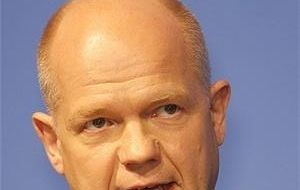MercoPress. South Atlantic News Agency
Hague this week becomes the first Foreign Secretary in six years to visit Brazil
 In an interview with British media before departure Hague had only praise for Brazil
In an interview with British media before departure Hague had only praise for Brazil This week William Hague becomes the first Foreign Secretary in six years to travel to Brazil. Hague was scheduled to visit Brazil last year, but was prevented by the swiftly-moving events of the Arab Spring and in that time Brazil overtook Britain to become the sixth largest economy in the world.
“It’s one of the emerging powers of the world” he said. “Its economy is in general growing quite rapidly. It’s a country which shares a lot of our values and it are a country which is relatively easy for British people to trade and deal with”.
“We are turning around decades of British withdrawal in Latin America” said Hague. “Now I think it is universally understood across the capitals of the region that Britain is expanding. Britain is coming back”.
Brazil is also the country that will follow the UK with the Olympics in 2016 “so it’s going to be the centre of a huge amount of attention over the next decade”, said the Foreign Secretary adding that “for all these reasons it is a country that we must not neglect, and that I feel has been neglected in previous years. This is one of the things we are putting right under the current government.”
Hague is a strong supporter of Brazil’s aspirations to become a permanent member of the United Nations Security Council, as the largest and most economically significant country in the region.
The Foreign Secretary point out to trade statistics to show how Britain’s business links with Brazil are increasing, and proudly points out that there have been 14 ministerial visits since the coalition government was formed in May 2010, compared to only 10 in the previous three years.
“So you can see the trebling, quadrupling of our effort that we are putting in to the relationship with Brazil”, said Hague pointing out that the balance of economic activity in the world is shifting all the time, to the East and to the South, which means that Europe is a smaller and smaller proportion of the world economy.
“The need for trade with the East and South is greater because of the economies in Europe is flat. It is a necessity, whatever happens in the Euro zone”.
Hague said that it is time for emerging “new world” powers, like Brazil, to play a more prominent role in events such as the Arab Spring. The country, he pointed out, abstained from UN Security Council Resolution 1973, which authorised the no-fly zone over Libya.
“With a country like Brazil, which shares so much of our values of supporting democracy and human rights at home, it is important to discuss with them how to uphold these values in the wider world. Because of course in Britain we feel we have a responsibility not only to uphold human rights and democracy here, but to support them there.
“And that has not been a preoccupation of the emerging powers. Their concern has been with their own economic situation”.
Foreign Secretary Hague will be hosting a discussion on the Arab Spring with a series of ambassadors in Brazil, as part of British attempts to increase pressure on the regime of president Bashar al-Assad. Sao Paulo, Brazil’s industrial and financial centre is considered the second largest Syrian city in the world only behind Damascus.




Top Comments
Disclaimer & comment rules-

-

-

Read all commentsThe foolish actions of the British in the Libya affair cost them about 200 million pounds; money that they had to borrow, and money that they sorely need to get out of a double dip recession - the net result was the installation of a strict muslim dictatorship style “sharia” government. This is NOT the style of democracy that the West should be wasting there money on. We are not are brothers keeper.
Jan 16th, 2012 - 10:04 am 0I think you mean the UN and led by the French and Italians?
Jan 16th, 2012 - 10:31 am 0I think that asking Brasil to promote 'Arab Spring' political freedom - meaning permanent islamic theocracies - is not the best way to get Brasil on board with 'Western Values'.
Jan 16th, 2012 - 11:26 am 0Commenting for this story is now closed.
If you have a Facebook account, become a fan and comment on our Facebook Page!